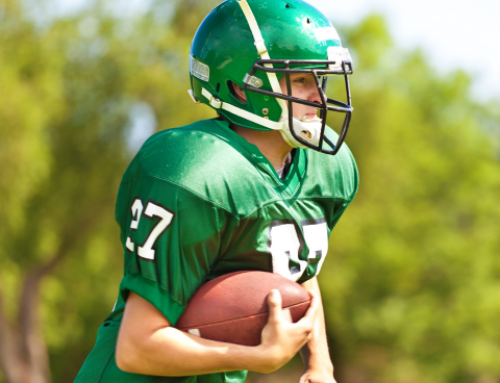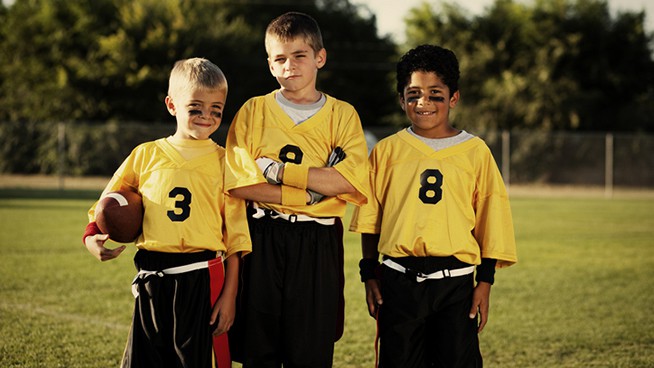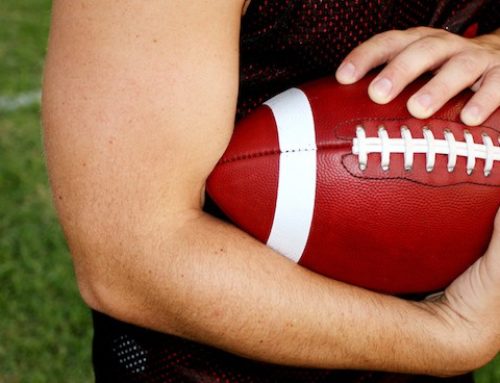Concussion FAQs
Heads up: With some 67,000 high school football players suffering concussions every year, and studies showing the incidence among female athletes is nearly as high, research about the long-term impact of head injuries should catch your eye. [5] (Learn about how concussions affect males and females.)
A recent study of 34 former NFL players published in JAMA Neurology concluded that more than two-fifths of them suffered from chronic traumatic encephalopathy (CTE), with symptoms like memory loss, confusion, aggressiveness and depression.
CTE is linked to athletes who have a history of head trauma, not just a single injury. (Read the latest research on contact and concussions.) No study has indicated that high school players are at risk for the degenerative disease. Properly treated, most high school athletes can fully recover from a concussion suffered on the field. But knowing when you’ve experienced a concussion and what to do about it can be difficult.
To help you better understand concussions and how to protect your brain, we reached out to Chris Nowinski, president of the Sports Legacy Institute and a leader in the field of concussion research.
STACK: When does a head injury result in a concussion?
Chris Nowinski: The answer varies from person to person. The American Association of Neurological Surgeons says a concussion occurs when a blow to the head results in a temporary loss of normal brain function. There’s no universal threshold.
What are common concussion symptoms?
Again, these are different for different people, but common symptoms include headaches, dizziness, confusion, ringing ears, vision problems, nausea, fatigue, irritability and memory loss.
If I don’t play a contact sport, can I get a concussion?
Yes. Athletes in all sports are at risk. In fact, a study done at Nationwide Children’s Hospital found that reported concussions happened nearly as often in girl’s high school soccer as they did in football during a two-season span.
Is it worse to sustain a concussion at a young age?
Evidence suggests concussions are worse for younger athletes. Their developing brains are more sensitive to the chemical changes that occur during such an injury, and young athletes take longer to recover. Young athletes are also less likely to be diagnosed when they suffer a concussion due to a lack of medical personnel on the sideline, creating additional danger of playing through the injury.
If I suffer a concussion, am I at risk for CTE?
Sustaining a concussion doesn’t mean you’ll suffer from CTE later in life. Most concussions are temporary injuries, and you can recover from them 100%. But if you return to play too soon, or suffer too many, a concussion can turn from a temporary injury into a more serious one.
A study conducted at the Boston University School of Medicine found CTE in athletes who were never diagnosed with a concussion. There is growing evidence that sub-concussive injury may also be damaging.
What should I do if I think I have a concussion?
The first thing you should do is get off the field. Your competitive spirit might make you want to play through it, but the long-term consequences make it not worth the risk. Report your symptoms to a coach, trainer or parent. Be your own advocate, and don’t let anyone pressure you into playing if you don’t feel 100%.
If a doctor’s examination finds that you have a concussion, rest. Recover. After your symptoms subside, get clearance from a doctor before returning to play.
Watch STACK’s Concussion Prevention and Awareness Series to learn more essential facts about concussions and their implications on your long-term health.
Sources
1) Marar M, McIlvain NM, Fields SK, Comstock RD. “Epidemiology of concussions among United States high school athletes in 20 sports.” American Journal of Sports Medicine. 2012; 40(4): 747-755.
2) Stern, R. A., Riley, D. O., Daneshvar, D. H., Nowinski, C. J., Cantu, R. C., McKee, A. C. “Long-term consequences of repetitive brain trauma: chronic traumatic encephalopathy.” PM&R. 2011; 10 Supplement 2: S460–467.
3) Broglio SP, Sosnoff JJ, Shin S, He X, Alcaraz C and Zimmerman J. “Head impacts during high school football: a biomechanical assessment.” Journal of Athletic Training. 2009; 44: 342-349.
4) Hart J, Kraut MA, Womack KB, et al. “Neuroimaging of Cognitive Dysfunction and Depression in Aging Retired National Football League Players: A Cross-sectional Study.” JAMA Neurology. 2013; January: 1-10.
5) Gessel et al., 2007; Powell & Barber-Foss, 1999; Covassin et al., 2003, summarized from http://www.womenssportsfoundation.org/home/research/articles-and-reports/mental-and-physical-health/female-athlete-and-concussions.
RECOMMENDED FOR YOU
MOST POPULAR
Concussion FAQs
Heads up: With some 67,000 high school football players suffering concussions every year, and studies showing the incidence among female athletes is nearly as high, research about the long-term impact of head injuries should catch your eye. [5] (Learn about how concussions affect males and females.)
A recent study of 34 former NFL players published in JAMA Neurology concluded that more than two-fifths of them suffered from chronic traumatic encephalopathy (CTE), with symptoms like memory loss, confusion, aggressiveness and depression.
CTE is linked to athletes who have a history of head trauma, not just a single injury. (Read the latest research on contact and concussions.) No study has indicated that high school players are at risk for the degenerative disease. Properly treated, most high school athletes can fully recover from a concussion suffered on the field. But knowing when you’ve experienced a concussion and what to do about it can be difficult.
To help you better understand concussions and how to protect your brain, we reached out to Chris Nowinski, president of the Sports Legacy Institute and a leader in the field of concussion research.
STACK: When does a head injury result in a concussion?
Chris Nowinski: The answer varies from person to person. The American Association of Neurological Surgeons says a concussion occurs when a blow to the head results in a temporary loss of normal brain function. There’s no universal threshold.
What are common concussion symptoms?
Again, these are different for different people, but common symptoms include headaches, dizziness, confusion, ringing ears, vision problems, nausea, fatigue, irritability and memory loss.
If I don’t play a contact sport, can I get a concussion?
Yes. Athletes in all sports are at risk. In fact, a study done at Nationwide Children’s Hospital found that reported concussions happened nearly as often in girl’s high school soccer as they did in football during a two-season span.
Is it worse to sustain a concussion at a young age?
Evidence suggests concussions are worse for younger athletes. Their developing brains are more sensitive to the chemical changes that occur during such an injury, and young athletes take longer to recover. Young athletes are also less likely to be diagnosed when they suffer a concussion due to a lack of medical personnel on the sideline, creating additional danger of playing through the injury.
If I suffer a concussion, am I at risk for CTE?
Sustaining a concussion doesn’t mean you’ll suffer from CTE later in life. Most concussions are temporary injuries, and you can recover from them 100%. But if you return to play too soon, or suffer too many, a concussion can turn from a temporary injury into a more serious one.
A study conducted at the Boston University School of Medicine found CTE in athletes who were never diagnosed with a concussion. There is growing evidence that sub-concussive injury may also be damaging.
What should I do if I think I have a concussion?
The first thing you should do is get off the field. Your competitive spirit might make you want to play through it, but the long-term consequences make it not worth the risk. Report your symptoms to a coach, trainer or parent. Be your own advocate, and don’t let anyone pressure you into playing if you don’t feel 100%.
If a doctor’s examination finds that you have a concussion, rest. Recover. After your symptoms subside, get clearance from a doctor before returning to play.
Watch STACK’s Concussion Prevention and Awareness Series to learn more essential facts about concussions and their implications on your long-term health.
Sources
1) Marar M, McIlvain NM, Fields SK, Comstock RD. “Epidemiology of concussions among United States high school athletes in 20 sports.” American Journal of Sports Medicine. 2012; 40(4): 747-755.
2) Stern, R. A., Riley, D. O., Daneshvar, D. H., Nowinski, C. J., Cantu, R. C., McKee, A. C. “Long-term consequences of repetitive brain trauma: chronic traumatic encephalopathy.” PM&R. 2011; 10 Supplement 2: S460–467.
3) Broglio SP, Sosnoff JJ, Shin S, He X, Alcaraz C and Zimmerman J. “Head impacts during high school football: a biomechanical assessment.” Journal of Athletic Training. 2009; 44: 342-349.
4) Hart J, Kraut MA, Womack KB, et al. “Neuroimaging of Cognitive Dysfunction and Depression in Aging Retired National Football League Players: A Cross-sectional Study.” JAMA Neurology. 2013; January: 1-10.
5) Gessel et al., 2007; Powell & Barber-Foss, 1999; Covassin et al., 2003, summarized from http://www.womenssportsfoundation.org/home/research/articles-and-reports/mental-and-physical-health/female-athlete-and-concussions.












